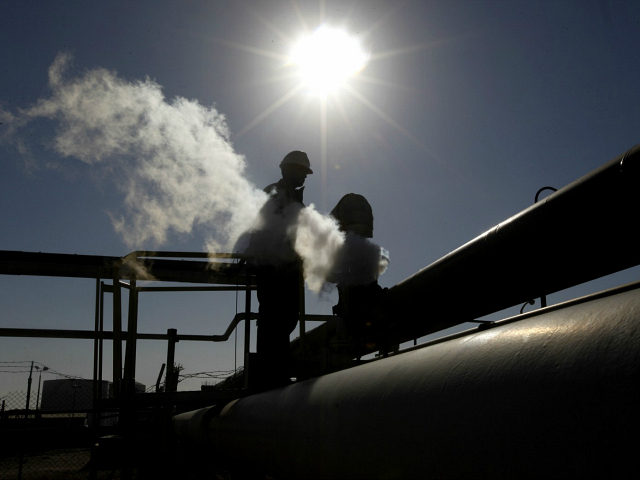Libya’s Government of National Accord (GNA) – the U.N.-recognized government currently under siege in Tripoli by one of the other major factions vying for control of the shattered country – on Thursday revoked the licenses of about 40 foreign oil and gas firms, including French giant Total.
Reuters portrayed the decision as the GNA lashing out against France and other countries that support Khalifa Haftar, the warlord camped on the outskirts of Tripoli, and the House of Representatives (HoR) political faction he represents:
Ties between Tripoli, home to the internationally recognized government, and France have been strained because Paris has ties to Tripoli as well as Khalifa Haftar, a commander whose troops have been trying to take the capital in a month-long battle.
Last month, the Tripoli-based interior ministry suspended security cooperation with France, accusing Paris of backing Haftar.
On Wednesday, Tripoli Premier Fayez al-Serraj had visited Paris, part of a tour to European capitals to drum up support.
After meeting Serraj, President Emmanuel Macron had called for a ceasefire in the battle for Libya’s capital Tripoli.
The UK Guardian saw Libya’s move as a gamble that could backfire and push France and other Western powers more firmly into Haftar’s camp:
But in the face of the weak French diplomatic backing, the GNA may have decided that economic reprisals were the best response. It has also threatened to end security cooperation. If the threat is carried out, Total is likely to challenge the legality of the Libyan government’s decision, and the move may worsen the deteriorating relations between Sarraj and Macron, pushing the French president more explicitly into the camp calling for Haftar to clear Tripoli of militia.
The GNA broadly believes too many western powers, influenced by the United Arab Emirates, Egypt and Saudi Arabia, are sympathetic to Haftar on the basis that he claims to be combatting terrorism in Libya.
Total is pumping a million barrels of oil per day out of Libya, having recently completed major acquisitions that gave it access to a 500 million barrel reserve plus valuable exploration potential.
Libyan Prime Minister Fayez al-Serraj said after his meeting with Macron that he wants France to develop “a clear political position on the situation on Libya in the future.”
Serraj said Libya’s factions were “getting close to an agreement and possibly a solution with international backing,” but Haftar’s attack on Tripoli “has put an end to any hope of reaching a political agreement.”
This seems markedly different from Macron’s announcement after the meeting with Sarraj that they agreed upon “the importance of extending and deepening the dialogue with all stakeholders in Libya, including in the east, south, and west of the country, and with civil society.” France clearly considers Haftar and his faction among those stakeholders.
Despite its decision not to renew all those foreign licenses, the GNA and the Libyan National Oil Corporation (NOC) are still determined to double Libyan oil production over the next few years. The NOC held meetings with American oil companies in Houston this week to discuss $60 billion in contract work needed to achieve that goal.
NOC chairman Mustafa Sanalia warned attendees at a conference in Houston on Wednesday that “the Tripoli assault and ongoing hostilities are a direct threat to Libyan oil sector development and procurement.”
Stated bluntly, some outside observers believe the GNA is too weak and self-absorbed to effectively govern Libya, and much too cozy with Islamist forces, up to and including ISIS and al-Qaeda. Haftar justified his attack on Tripoli by accusing the GNA of working with the same terrorist groups his Libyan National Army has been fighting in the south and his criticism was reinforced when a large number of dodgy militia types rapidly converged on Tripoli to thwart his advance.
Conversely, much of the international community frowns on military coups against internationally-recognized governments as a matter of principle, although it can be persuaded to forget that principle in places like Yemen. Haftar threw the first punch in a dispute the international community was very eager to resolve through dialogue.
Securing the flow of oil from Libya will be a decisive factor in much foreign decision-making. Both Haftar and the GNA could win support by promising to protect it or alienate international allies by threatening to choke it off. The GNA constantly warns about Haftar threatening to cut the oil supply, but the French might argue the government in Tripoli is the first party to actually do it.

COMMENTS
Please let us know if you're having issues with commenting.